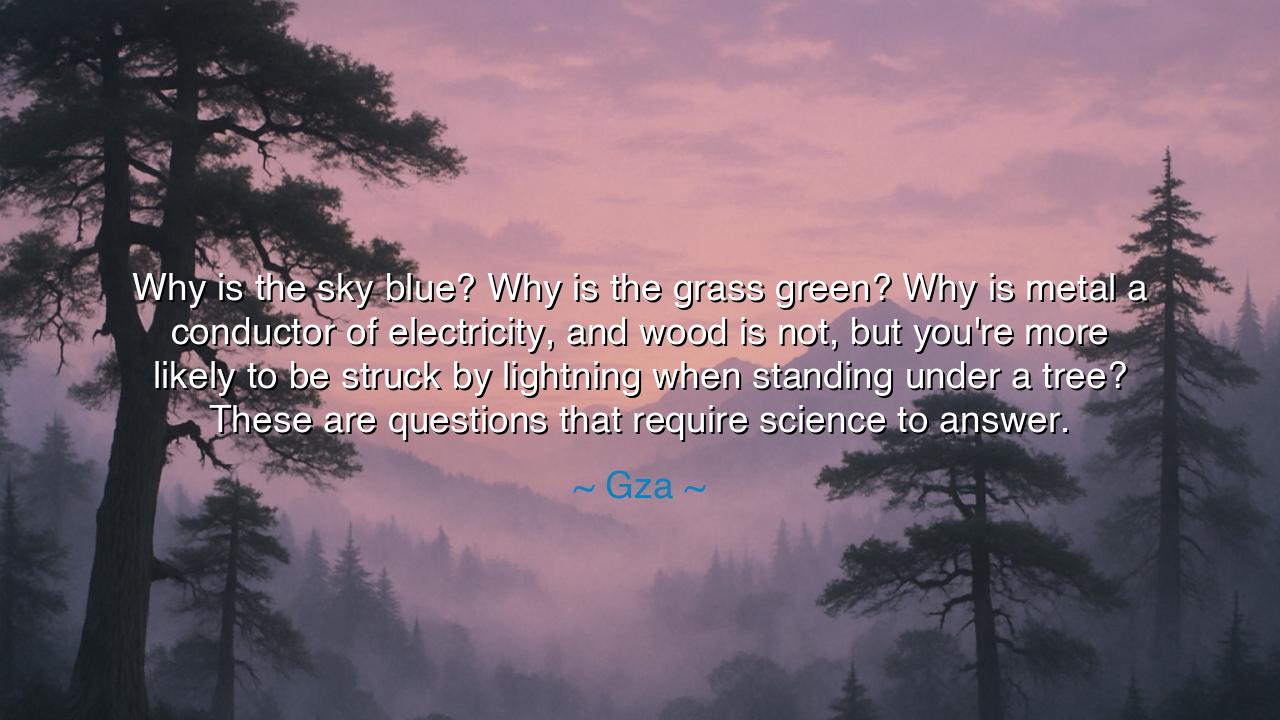
Why is the sky blue? Why is the grass green? Why is metal a
Why is the sky blue? Why is the grass green? Why is metal a conductor of electricity, and wood is not, but you're more likely to be struck by lightning when standing under a tree? These are questions that require science to answer.






"Why is the sky blue? Why is the grass green? Why is metal a conductor of electricity, and wood is not, but you're more likely to be struck by lightning when standing under a tree? These are questions that require science to answer." These words of Gza, a philosopher and poet of modern times, echo with the ancient spirit of inquiry. In asking these seemingly simple questions, Gza captures the profound curiosity that has driven humanity from the dawn of civilization to seek knowledge, to uncover the mysteries of the world that surrounds us. He speaks not just of facts to be learned, but of the deep wonder that comes from understanding the forces that shape our world—the science that answers the questions that arise from our everyday experiences.
From the earliest thinkers, the ancients sought to understand the world through observation and reason. Aristotle, with his keen eye for nature, asked why the sky seemed to shift colors with the rising and setting of the sun, why the elements of fire, earth, air, and water seemed to behave as they did. Like Gza, these ancient minds were drawn not only to the beauty of nature but to its mysteries. They sought to understand the deeper truths that lay beneath the surface of phenomena, believing that through reason and observation, humanity could unlock the principles that governed the universe. For Aristotle, science was more than just knowledge; it was the pursuit of the deeper order of nature, the path to wisdom.
Consider the story of Galileo Galilei, a man whose curiosity and courage would forever change our understanding of the heavens. When Galileo turned his telescope to the sky and observed the moons of Jupiter, he dared to ask the questions that had never been asked before. He was not content with simple explanations; he sought the deeper reasons behind the motions of the planets, the composition of the stars, and the very nature of the universe. His discoveries shook the foundations of the church and established him as one of the greatest pioneers of the scientific revolution. Like Gza, Galileo's questions were simple, yet profound. "Why does the moon appear to move in a way so different from the stars?" "What are the true motions of the planets?" These questions demanded science—the pursuit of deeper understanding through inquiry and observation.
The modern world, like the ancient one, is filled with mysteries waiting to be understood. The question of why the sky is blue and why grass is green may seem trivial to some, but they are rooted in the laws of light, the way different wavelengths of the sun’s energy interact with the Earth’s atmosphere and plants. The green of grass is the result of chlorophyll, which absorbs red and blue light and reflects green light. Similarly, the question of why metal conducts electricity while wood does not is answered by the properties of atoms and electrons. Metal allows electrons to move freely, while wood’s structure holds the electrons tightly. And the mystery of why a tree is more likely to attract lightning comes down to its height and the fact that trees are often taller and provide a pathway for the discharge of electrical energy from the atmosphere.
These questions, though simple on the surface, embody a profound truth: they require the tools of science to answer. Science, at its core, is not just about gathering data but about seeking understanding in ways that transcend the immediate, to delve into the underlying principles that govern all things. Whether we are seeking to understand the nature of the earth, the stars, or the very building blocks of life itself, science offers the tools to transform wonder into knowledge. It is through science that the natural world reveals its secrets, and it is through the pursuit of these questions that humanity moves closer to understanding its place in the cosmos.
The lesson we must draw from Gza’s words is this: curiosity is the spark that drives us toward greater understanding, and science is the fire that illuminates the path forward. Every question we ask, no matter how small or seemingly insignificant, is an invitation to seek deeper truths. Just as the ancient philosophers and scientists sought the answers to their burning questions, so too must we approach the world around us with a spirit of inquiry and a deep respect for the processes that govern all things. The answers may not always come easily, but in the pursuit of truth, we grow as individuals and as a society.
In our own lives, let us cultivate this spirit of curiosity and inquiry. Let us ask the questions that arise in our hearts, not just about the world of nature, but about our own existence, our relationships, and our role in shaping the future. Let us embrace science as a path to understanding, not as a mere collection of facts, but as a journey that connects us to the mysteries of the universe. As we seek the answers to the questions that arise before us, may we never lose the sense of wonder that drives us to seek, to explore, and to grow. For in every question lies the possibility of deeper understanding, and in every answer, a new question waiting to be asked.






AAdministratorAdministrator
Welcome, honored guests. Please leave a comment, we will respond soon